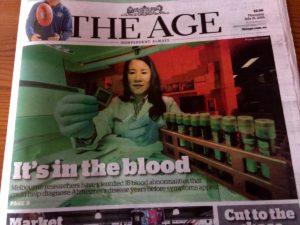The ‘breakthrough’ story
This is the front page of The Age, Melbourne’s serious newspaper, today:
As Jack Scanlan observed on Twitter, it’s great to see science on the front page. On the other hand, the story is an example of how the ‘breakthrough’ narrative dominates science stories (as Scanlan himself wrote in Lateral magazine back in February).
The description of the research itself is fine, but the impact is a bit overplayed
“The idea is to screen people who aren’t displaying symptoms,” Dr Cheng said. “We can then identify their risk of developing Alzheimer’s disease and intervene earlier.”
Eventually that’s going to work, but right now we don’t know how to intervene and so there’s not much point in doing it earlier.
From the viewpoint of journalism, though, there’s another issue. Just in New Zealand papers over the past few years we have:
- Has a 15-year-old found a way to test for Alzheimer’s? (Herald, 7/2015)
- Blood test could detect dementia (Herald, 3/2014)
- Blood test could give ten year warning of Alzheimer’s (Herald, 6/2015)
- Alzheimer’s blood test hope (Herald, 7/2014)
- Excitement over Alzheimer’s discovery (Otago Daily Times, 4/2016)
The last one even uses the same approach, measuring microRNAs in blood samples. It’s a good idea; it’s good science; it may eventually be useful. It’s not a unique breakthrough.
Thomas Lumley (@tslumley) is Professor of Biostatistics at the University of Auckland. His research interests include semiparametric models, survey sampling, statistical computing, foundations of statistics, and whatever methodological problems his medical collaborators come up with. He also blogs at Biased and Inefficient See all posts by Thomas Lumley »

When a story has a headline like:
“Has a 15-year-old found a way to test for Alzheimer’s?”
It means: “We want you to get excited about this story but we’ve no idea if there’s any validity, that’s why we’ve made it into a nervous question”.
Or, shorter version: The answer is no.
9 years ago
Yes, that one was Betteridge’s-Law compliant.
But the others were real, and there are more that didn’t make the NZ papers.
9 years ago